grammar terms 英语语法复习 专业四级
- 格式:doc
- 大小:45.00 KB
- 文档页数:10
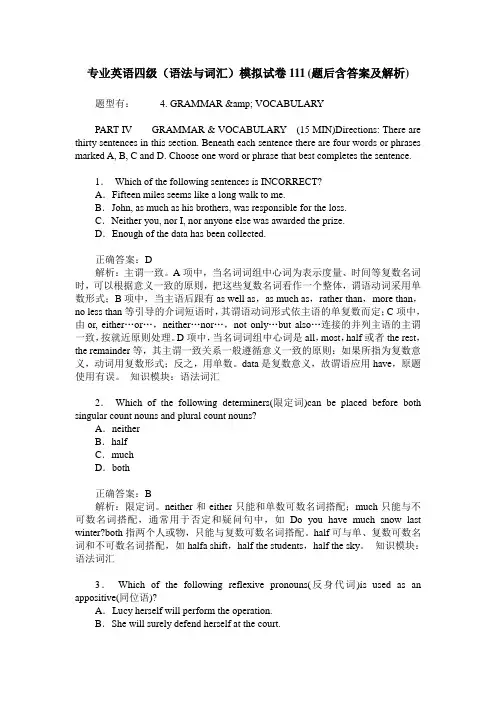
专业英语四级(语法与词汇)模拟试卷111(题后含答案及解析) 题型有: 4. GRAMMAR & VOCABULARYPART IV GRAMMAR & VOCABULARY (15 MIN)Directions: There are thirty sentences in this section. Beneath each sentence there are four words or phrases marked A, B, C and D. Choose one word or phrase that best completes the sentence.1.Which of the following sentences is INCORRECT?A.Fifteen miles seems like a long walk to me.B.John, as much as his brothers, was responsible for the loss.C.Neither you, nor I, nor anyone else was awarded the prize.D.Enough of the data has been collected.正确答案:D解析:主谓一致。
A项中,当名词词组中心词为表示度量、时间等复数名词时,可以根据意义一致的原则,把这些复数名词看作一个整体,谓语动词采用单数形式;B项中,当主语后跟有as well as,as much as,rather than,more than,no less than等引导的介词短语时,其谓语动词形式依主语的单复数而定;C项中,由or, either…or…,neither…nor…,not only…but also…连接的并列主语的主谓一致,按就近原则处理。
D项中,当名词词组中心词是all,most,half或者the rest,the remainder等,其主谓一致关系一般遵循意义一致的原则:如果所指为复数意义,动词用复数形式;反之,用单数。
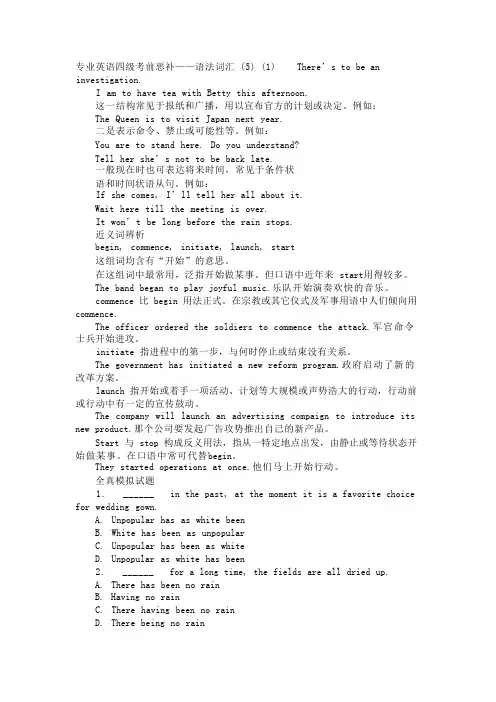
专业英语四级考前恶补——语法词汇 (5) (1) There’s to be an investigation.I am to have tea with Betty this afternoon.这一结构常见于报纸和广播,用以宣布官方的计划或决定。
例如:The Queen is to visit Japan next year.二是表示命令、禁止或可能性等。
例如:You are to stand here. Do you understand?Tell her she’s not to be back late.一般现在时也可表达将来时间,常见于条件状语和时间状语从句。
例如:If she comes, I’ll tell her all about it.Wait here till the meeting is over.It won’t be long before the rain stops.近义词辨析begin, commence, initiate, launch, start这组词均含有“开始”的意思。
在这组词中最常用,泛指开始做某事。
但口语中近年来 start用得较多。
The band began to play joyful music.乐队开始演奏欢快的音乐。
commence 比 begin 用法正式。
在宗教或其它仪式及军事用语中人们倾向用commence.The officer ordered the soldiers to commence the attack.军官命令士兵开始进攻。
initiate 指进程中的第一步,与何时停止或结束没有关系。
The government has initiated a new reform program.政府启动了新的改革方案。
launch 指开始或着手一项活动、计划等大规模或声势浩大的行动,行动前或行动中有一定的宣传鼓动。
The company will launch an advertising compaign to introduce its new product.那个公司要发起广告攻势推出自己的新产品。
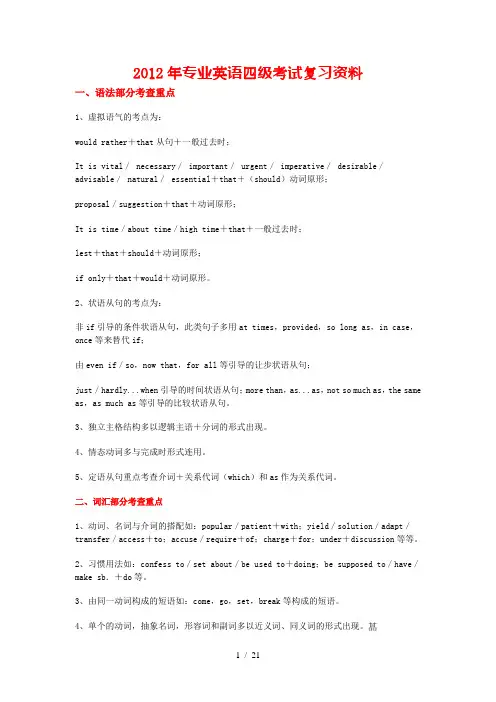
2012年专业英语四级考试复习资料一、语法部分考查重点1、虚拟语气的考点为:would rather+that从句+一般过去时;It is vital/ necessary/ important/ urgent/ imperative/ desirable/advisable/ natural/ essential+that+(should)动词原形;proposal/suggestion+that+动词原形;It is time/about time/high time+that+一般过去时;lest+that+should+动词原形;if only+that+would+动词原形。
2、状语从句的考点为:非if引导的条件状语从句,此类句子多用at times,provided,so long as,in case,once等来替代if;由even if/so,now that,for all等引导的让步状语从句;just/hardly...when引导的时间状语从句;more than,as...as,not so much as,the same as,as much as等引导的比较状语从句。
3、独立主格结构多以逻辑主语+分词的形式出现。
4、情态动词多与完成时形式连用。
5、定语从句重点考查介词+关系代词(which)和as作为关系代词。
二、词汇部分考查重点1、动词、名词与介词的搭配如:popular/patient+with;yield/solution/adapt/transfer/access+to;accuse/require+of;charge+for;under+discussion等等。
2、习惯用法如:confess to/set about/be used to+doing;be supposed to/have/make sb.+do等。
3、由同一动词构成的短语如:come,go,set,break等构成的短语。
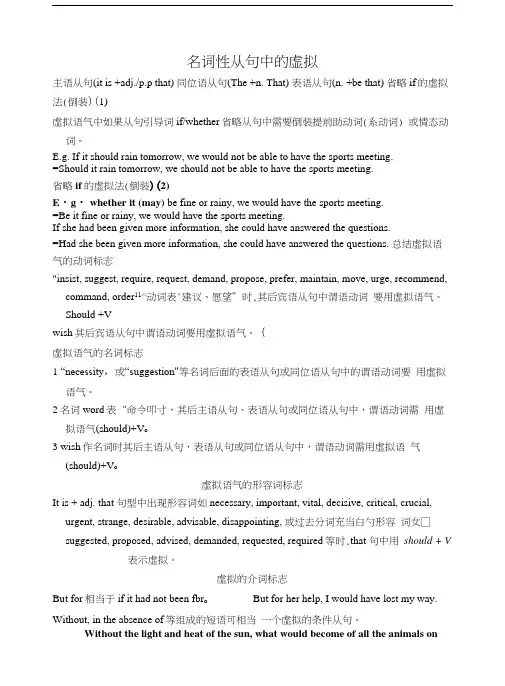
名词性从句中的虚拟主语从句(it is +adj./p.p that) 同位语从句(The +n. That) 表语从句(n. +be that) 省略if的虚拟法(倒装)(1)虚拟语气中如果从句引导词if/whether省略从句中需要倒装提前助动词(系动词) 或情态动词。
E.g. If it should rain tomorrow, we would not be able to have the sports meeting.=Should it rain tomorrow, we should not be able to have the sports meeting.省略if的虚拟法(倒装)(2)E・g・ whether it (may) be fine or rainy, we would have the sports meeting.=Be it fine or rainy, we would have the sports meeting.If she had been given more information, she could have answered the questions.=Had she been given more information, she could have answered the questions. 总结虚拟语气的动词标志"insist, suggest, require, request, demand, propose, prefer, maintain, move, urge, recommend,command, order11^动词表'建议、愿望”时,其后宾语从句中谓语动词要用虚拟语气。
Should +Vwish其后宾语从句中谓语动词要用虚拟语气。
{虚拟语气的名词标志1 “necessity,或“suggestion"等名词后面的表语从句或同位语从句中的谓语动词要用虚拟语气。
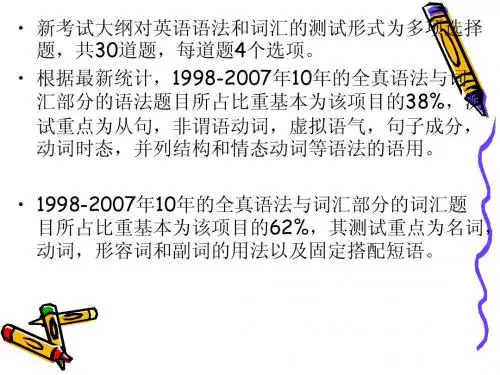
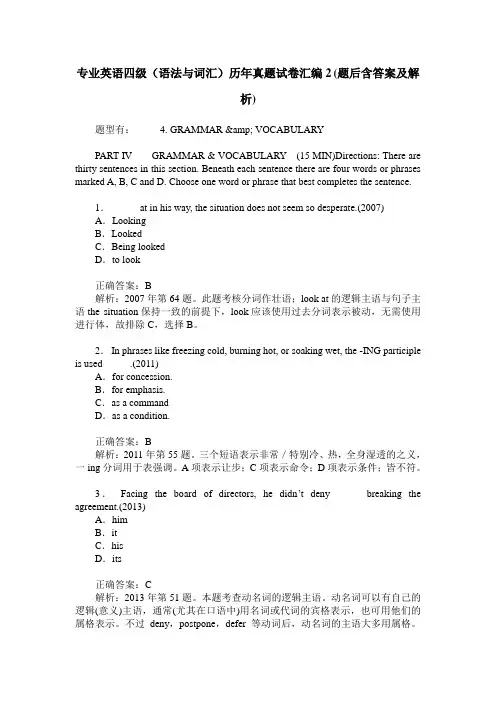
专业英语四级(语法与词汇)历年真题试卷汇编2(题后含答案及解析)题型有: 4. GRAMMAR & VOCABULARYPART IV GRAMMAR & VOCABULARY (15 MIN)Directions: There are thirty sentences in this section. Beneath each sentence there are four words or phrases marked A, B, C and D. Choose one word or phrase that best completes the sentence.1._____at in his way, the situation does not seem so desperate.(2007)A.LookingB.LookedC.Being lookedD.to look正确答案:B解析:2007年第64题。
此题考核分词作壮语;look at的逻辑主语与句子主语the situation保持一致的前提下,look应该使用过去分词表示被动,无需使用进行体,故排除C,选择B。
2.In phrases like freezing cold, burning hot, or soaking wet, the -ING participle is used _____.(2011)A.for concession.B.for emphasis.C.as a commandD.as a condition.正确答案:B解析:2011年第55题。
三个短语表示非常/特别冷、热,全身湿透的之义,一ing分词用于表强调。
A项表示让步;C项表示命令;D项表示条件;皆不符。
3.Facing the board of directors, he didn’t deny______ breaking the agreement.(2013)A.himB.itC.hisD.its正确答案:C解析:2013年第51题。
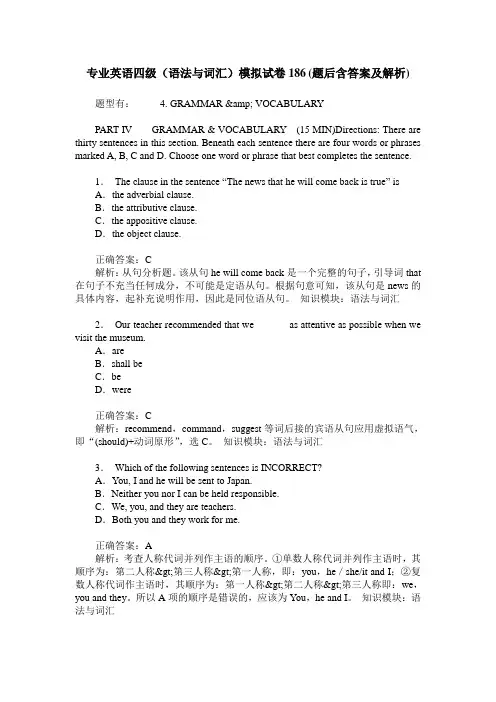
专业英语四级(语法与词汇)模拟试卷186(题后含答案及解析) 题型有: 4. GRAMMAR & VOCABULARYPART IV GRAMMAR & VOCABULARY (15 MIN)Directions: There are thirty sentences in this section. Beneath each sentence there are four words or phrases marked A, B, C and D. Choose one word or phrase that best completes the sentence.1.The clause in the sentence “The news that he will come back is true” isA.the adverbial clause.B.the attributive clause.C.the appositive clause.D.the object clause.正确答案:C解析:从句分析题。
该从句he will come back是一个完整的句子,引导词that 在句子不充当任何成分,不可能是定语从句。
根据句意可知,该从句是news的具体内容,起补充说明作用,因此是同位语从句。
知识模块:语法与词汇2.Our teacher recommended that we ______ as attentive as possible when we visit the museum.A.areB.shall beC.beD.were正确答案:C解析:recommend,command,suggest等词后接的宾语从句应用虚拟语气,即“(should)+动词原形”,选C。
知识模块:语法与词汇3.Which of the following sentences is INCORRECT?A.You, I and he will be sent to Japan.B.Neither you nor I can be held responsible.C.We, you, and they are teachers.D.Both you and they work for me.正确答案:A解析:考查人称代词并列作主语的顺序。
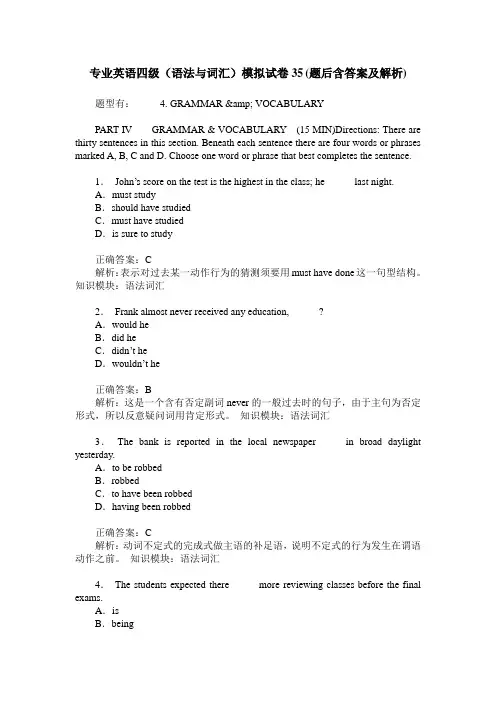
专业英语四级(语法与词汇)模拟试卷35(题后含答案及解析)题型有: 4. GRAMMAR & VOCABULARYPART IV GRAMMAR & VOCABULARY (15 MIN)Directions: There are thirty sentences in this section. Beneath each sentence there are four words or phrases marked A, B, C and D. Choose one word or phrase that best completes the sentence.1.John’s score on the test is the highest in the class; he______last night.A.must studyB.should have studiedC.must have studiedD.is sure to study正确答案:C解析:表示对过去某一动作行为的猜测须要用must have done这一句型结构。
知识模块:语法词汇2.Frank almost never received any education,______?A.would heB.did heC.didn’t heD.wouldn’t he正确答案:B解析:这是一个含有否定副词never的一般过去时的句子,由于主句为否定形式,所以反意疑问词用肯定形式。
知识模块:语法词汇3.The bank is reported in the local newspaper______in broad daylight yesterday.A.to be robbedB.robbedC.to have been robbedD.having been robbed正确答案:C解析:动词不定式的完成式做主语的补足语,说明不定式的行为发生在谓语动作之前。
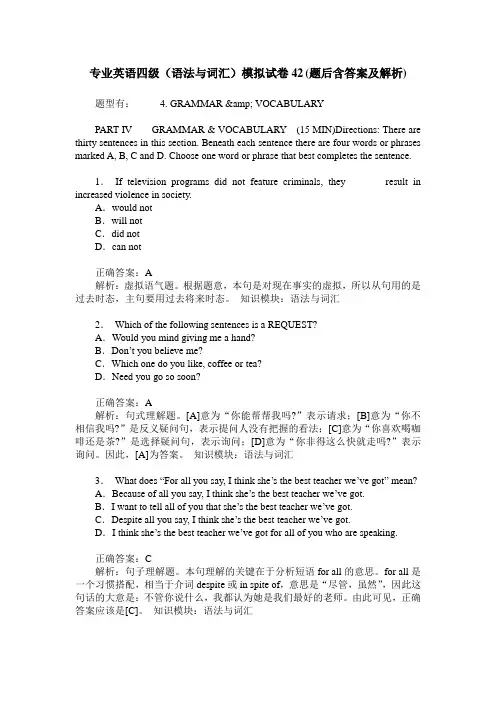
专业英语四级(语法与词汇)模拟试卷42(题后含答案及解析) 题型有: 4. GRAMMAR & VOCABULARYPART IV GRAMMAR & VOCABULARY (15 MIN)Directions: There are thirty sentences in this section. Beneath each sentence there are four words or phrases marked A, B, C and D. Choose one word or phrase that best completes the sentence.1.If television programs did not feature criminals, they ______ result in increased violence in society.A.would notB.will notC.did notD.can not正确答案:A解析:虚拟语气题。
根据题意,本句是对现在事实的虚拟,所以从句用的是过去时态,主句要用过去将来时态。
知识模块:语法与词汇2.Which of the following sentences is a REQUEST?A.Would you mind giving me a hand?B.Don’t you believe me?C.Which one do you like, coffee or tea?D.Need you go so soon?正确答案:A解析:句式理解题。
[A]意为“你能帮帮我吗?”表示请求;[B]意为“你不相信我吗?”是反义疑问句,表示提问人没有把握的看法;[C]意为“你喜欢喝咖啡还是茶?”是选择疑问句,表示询问;[D]意为“你非得这么快就走吗?”表示询问。
因此,[A]为答案。
知识模块:语法与词汇3.What does “For all you say, I think she’s the best teacher we’ve got” mean?A.Because of all you say, I think she’s the best teacher we’ve got.B.I want to tell all of you that she’s the best teacher we’ve got.C.Despite all you say, I think she’s the best teacher we’ve got.D.I think she’s the best teacher we’ve got for all of you who are speaking.正确答案:C解析:句子理解题。
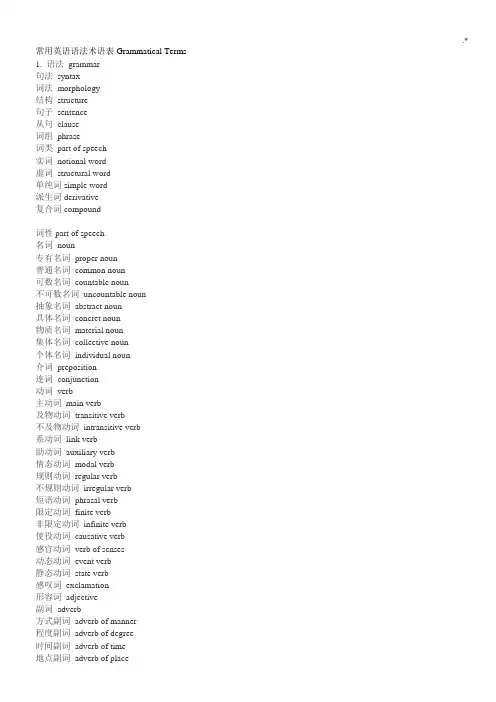
常用英语语法术语表Grammatical Terms 1. 语法grammar句法syntax词法morphology结构structure句子sentence从句clause词组phrase词类part of speech实词notional word虚词structural word单纯词simple word派生词derivative复合词compound词性part of speech名词noun专有名词proper noun普通名词common noun可数名词countable noun不可数名词uncountable noun抽象名词abstract noun具体名词concret noun物质名词material noun集体名词collective noun个体名词individual noun介词preposition连词conjunction动词verb主动词main verb及物动词transitive verb不及物动词intransitive verb系动词link verb助动词auxiliary verb情态动词modal verb规则动词regular verb不规则动词irregular verb短语动词phrasal verb限定动词finite verb非限定动词infinite verb使役动词causative verb感官动词verb of senses动态动词event verb静态动词state verb感叹词exclamation形容词adjective副词adverb方式副词adverb of manner程度副词adverb of degree时间副词adverb of time地点副词adverb of place修饰性副词adjunct连接性副词conjunct疑问副词interogative adverb关系副词relative adverb代词pronoun人称代词personal pronoun物主代词possesive pronoun反身代词reflexive pronoun相互代词reciprocal pronoun指示代词demonstrative pronoun疑问代词interrogative pronoun关系代词relative pronoun不定代词indefinite pronoun物主代词possecive pronoun名词性物主代词nominal possesive prnoun形容词性物主代词adjectival possesive pronoun冠词article定冠词definite article不定冠词indefinite article数词numeral基数词cardinal numeral序数词ordinal numeral分数词fractional numeral形式form单数形式singular form复数形式plural form限定动词finite verb form非限定动词non-finite verb form原形base form2.morphology词法notional实词form word虚词word-building构词法root词根prefix前缀suffix后缀synonym同义词antonym反义词conversion转化法derivation派生法affixation词缀法composition合成法compound复合词parts of speech词类noun名词pronoun代词numeral数词adjective形容词verb动词adverb副词article冠词preposition介词conjunction连词interjection感叹词particle引导词classification of nouns名词的分类common noun普通名词proper noun专有名词collective noun集合名词material noun物质名词abstract noun抽象名词countable noun可数名词personal pronoun人称代词possessive pronoun物主代词reflexive pronoun反身代词demonstrative pronoun指示代词interrogative pronoun疑问代词relative pronoun关系代词indefinite pronoun不定代词reciprocal pronoun相互代词case格nominative case主格objective case宾格possessive case所有格singular form单数形式plural form复数形式cardinal numeral基数词ordinal numeral序数词fraction numeral分数数词degrees of comparison比较级positive degree原级comparative degree比较级superlative degree最高级notional verb实义动词modal verb情态动词link verb连系动词auxiliary verb助动词transitive verb及物动词intransitive verb不及物动词regular verb规则动词irregular verb不规则动词finite verb限定动词non-finite verb非限定动词person人称number数gender性tense时态voice语态mood语气principal forms of verbs动词的主要形式present form现在形式past form过去形式participle分词present participle现在分词past participle过去分词infinitive不定式gerund动名词verbal noun动名词simple present tense一般现在时simple past tense一般过去时simple future tense一般将来时present continuous tense现在进行时past continuous tense过去进行时future continuous tense将来进行时past perfect tense过去完成时future perfect tense将来完成时present perfect continuous tense现在完成进行时future perfect continuous tense将来完成进行时sequence of tenses时态的呼应passive voice被动语态active voice主动语态indicative mood陈述语气imperative mood祈使语气subjunctive mood虚拟语气adverb of time 时间副词adverb of place地点副词adverb of manner方式副词adverb of degree程度副词adverb of frequency频度副词conjunctive adverb连接副词definite article定冠词indefinite article不定冠词coordinating conjunction并列连词subordinating conjunction从属连词syntax句法declarative sentence陈述句imperative sentence祈使句exclamatory sentence感叹句interrogative sentence疑问句general question一般疑问句special question特殊疑问句alternative question选择疑问句disjunctive question反意疑问句simple sentence简单句compound sentence并列句语法术语Grammar Terms 语法grammar句法syntax词法morphology结构structure句子sentence从句clause词组phrase词类part of speech实词notional word虚词structural word名词noun专有名词proper noun普通名词common noun可数名词countable noun不可数名词uncountable noun抽象名词abstract noun具体名词concrete noun物质名词material noun集体名词collective noun个体名词individual noun介词preposition连词conjunction动词verb主动词main verb及物动词transitive verb不及物动词intransitive verb系动词link verb助动词auxiliary verb情态动词modal verb规则动词regular verb不规则动词irregular verb短语动词phrasal verb限定动词finite verb非限定动词infinite verb使役动词causative verb感官动词verb of senses动态动词event verb静态动词state verb感叹词exclamation形容词adjective副词adverb方式副词adverb of manner程度副词adverb of degree时间副词adverb of time地点副词adverb of place修饰性副词adjunct连接性副词conjunct疑问副词interrogative adverb关系副词relative adverb代词pronoun人称代词personal pronoun物主代词possessive pronoun反身代词reflexive pronoun相互代词reciprocal pronoun指示代词demonstrative pronoun疑问代词interrogative pronoun关系代词relative pronoun不定代词indefinite pronoun名词性物主代词nominal possessive pronoun形容词性物主代词adjectival possessive pronoun冠词article定冠词definite article不定冠词indefinite article数词numeral基数词cardinal numeral序数词ordinal numeral分数词fractional numeral形式form单数形式singular form复数形式plural form限定动词finite verb form非限定动词non-finite verb form原形base form从句clause从属句subordinate clause并列句coordinate clause名词从句nominal clause定语从句attributive clause状语从句adverbial clause宾语从句object clause主语从句subject clause同位语从句appositive clause时间状语从句adverbial clause of time地点状语从句adverbial clause of place方式状语从句adverbial clause of manner让步状语从句adverbial clause of concession原因状语从句adverbial clause of cause结果状语从句adverbial clause of result目的状语从句adverbial clause of purpose条件状语从句adverbial clause of condition真实条件状语从句adverbial clause of real condition非真实条件状语从句adverbial clause of unreal condition 含蓄条件句adverbial clause of implied condition错综条件句adverbial clause of mixed condition句子sentence简单句simple sentence并列句compound sentence复合句complex sentence并列复合句compound complex sentence陈述句declarative sentence疑问句interrogative sentence一般疑问句general question特殊疑问句special question选择疑问句alternative question附加疑问句tag question反义疑问句disjunctive question修辞疑问句rhetorical question感叹疑问句exclamatory question存在句existential sentence肯定句positive sentence否定句negative sentence祈使句imperative sentence省略句elliptical sentence感叹句exclamatory sentence基本句型basic sentence pattern句子成分members of sentences主语subject谓语predicate宾语object双宾语dual object直接宾语direct object间接宾语indirect object复合宾语complex object同源宾语cognate object补语complement主补subject complement宾补object complement表语predicative定语attribute同位语appositive状语adverbial句法关系syntactic relationship并列coordinate从属subordination修饰modification前置修饰pre-modification后置修饰post-modification限制restriction双重限制double-restriction非限制non-restriction数number单数形式singular form复数形式plural form规则形式regular form不规则形式irregular form格case普通格common case所有格possessive case主格nominative case宾格objective case性gender阳性masculine阴性feminine通性common中性neuter人称person第一人称first person第二人称second person第三人称third person时态tense过去将来时past future tense过去将来进行时past future continuous tense过去将来完成时past future perfect tense一般现在时present simple tense一般过去时past simple tense一般将来时future simple tense现在完成时past perfect tense过去完成时present perfect tense将来完成时future perfect tense现在进行时present continuous tense过去进行时past continuous tense将来进行时future continuous tense过去将来进行时past future continuous tense现在完成进行时present perfect continuous tense 过去完成进行时past perfect continuous tense语态voice主动语态active voice被动语态passive voice语气mood陈述语气indicative mood祈使语气imperative mood虚拟语气subjunctive mood否定negation否定范围scope of negation全部否定full negation局部否定partial negation转移否定shift of negation语序order自然语序natural order倒装语序inversion全部倒装full inversion部分倒装partial inversion直接引语direct speech间接引语indirect speech自由直接引语free direct speech自由间接引语free indirect speech一致agreement主谓一致subject-predicate agreement 语法一致grammatical agreement概念一致notional agreement就近原则principle of proximity强调emphasis重复repetition语音pronunciation语调tone升调rising tone降调falling tone降升调falling-rising tone文体style正式文体formal非正式文体informal口语spoken/oral English感情色彩emotional coloring褒义commendatory贬义derogatory幽默humorous讽刺sarcastic挖苦ironic。
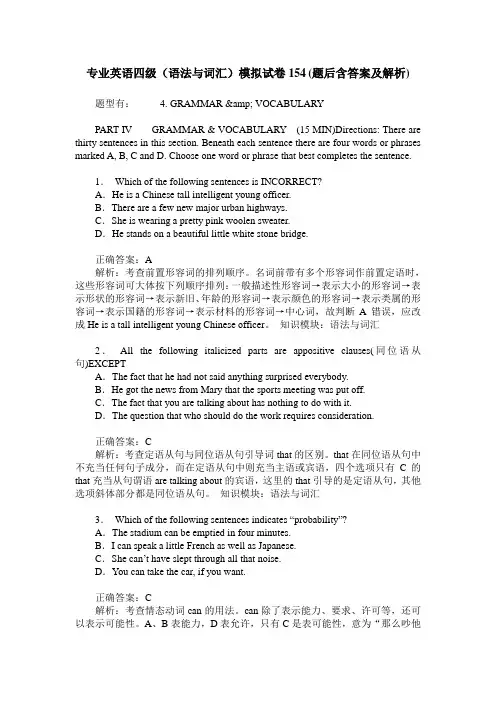
专业英语四级(语法与词汇)模拟试卷154(题后含答案及解析) 题型有: 4. GRAMMAR & VOCABULARYPART IV GRAMMAR & VOCABULARY (15 MIN)Directions: There are thirty sentences in this section. Beneath each sentence there are four words or phrases marked A, B, C and D. Choose one word or phrase that best completes the sentence.1.Which of the following sentences is INCORRECT?A.He is a Chinese tall intelligent young officer.B.There are a few new major urban highways.C.She is wearing a pretty pink woolen sweater.D.He stands on a beautiful little white stone bridge.正确答案:A解析:考查前置形容词的排列顺序。
名词前带有多个形容词作前置定语时,这些形容词可大体按下列顺序排列:一般描述性形容词→表示大小的形容词→表示形状的形容词→表示新旧、年龄的形容词→表示颜色的形容词→表示类属的形容词→表示国籍的形容词→表示材料的形容词→中心词,故判断A错误,应改成He is a tall intelligent young Chinese officer。
知识模块:语法与词汇2.All the following italicized parts are appositive clauses(同位语从句)EXCEPTA.The fact that he had not said anything surprised everybody.B.He got the news from Mary that the sports meeting was put off.C.The fact that you are talking about has nothing to do with it.D.The question that who should do the work requires consideration.正确答案:C解析:考查定语从句与同位语从句引导词that的区别。
专业英语四级(语法与词汇)模拟试卷165(题后含答案及解析) 题型有: 4. GRAMMAR & VOCABULARYPART IV GRAMMAR & VOCABULARY (15 MIN)Directions: There are thirty sentences in this section. Beneath each sentence there are four words or phrases marked A, B, C and D. Choose one word or phrase that best completes the sentence.1.The sentence that expresses REQUEST isA.Just do it right now.B.Take it easy. It’ll be ok.C.Please pass me the paper.D.Welcome to the plaza正确答案:C解析:A“立刻做!”是一种命令;B“放松点,一切都会好的。
”带有安慰的语气;C“请把试卷递给我!”表示请求;D“欢迎来到广场!”通常是迎客用语。
故答案为C。
知识模块:语法与词汇2.In “The little girl is left alone in the house, weeping bitterly” the italicized part is the ______ of the sentence.A.indirect objectB.adverbialC.direct objectD.object complement正确答案:B解析:现在分词weeping bitterly在句中作伴随状语,说明小女孩哭的状态,答案为B。
知识模块:语法与词汇3.I believe watching TV is ______ listening to radio.A.so good or better thanB.like good or better thanC.as good as or better thanD.as good as or better正确答案:C解析:考查形容词比较结构的用法。
专业英语四级(语法)模拟试卷12(题后含答案及解析) 题型有: 4. GRAMMAR & VOCABULARYPART IV GRAMMAR & VOCABULARY (15 MIN)Directions: There are thirty sentences in this section. Beneath each sentence there are four words or phrases marked A, B, C and D. Choose one word or phrase that best completes the sentence.1.______we go swimming every day______us a lot of good.A.If; doB.That; doC.If; doesD.That; does正确答案:D2.It______Bob drives badly.A.thinks thatB.is thought whatC.thought thatD.is thought that正确答案:D3.It’s uncertain______the experiment is worth doing.A.ifB.thatC.whetherD.how正确答案:C4.______the boy didn’t take medicine made his mother angry.A.ThatB.WhatC.HowD.Which正确答案:A5.______we can’t get seems better than______we have.A.What; whatB.What; thatC.That; thatD.That; what正确答案:A6.______you don’t like him is none of my business.A.WhatB.WhoC.ThatD.Whether正确答案:C7.______we’ll go camping tomorrow depends on the weather.A.IfB.WhetherC.ThatD.Where正确答案:B8.______ is going to do the job will be decided by the Party committee. A.ThatB.WhyC.HowD.Who正确答案:D9.______we’ll finish translating the book depends on the time. A.WhenB.WhyC.WhatD.That正确答案:A10.______he won’t go there is clear to all of us.A.HowB.WhatC.WhyD.This正确答案:C11.______the house will be built will be discussed at tomorrow’s meeting.A.IfB.WhereC.ThatD.What正确答案:B12.______you come or not is up to you.A.WhatB.IfC.WhyD.Whether正确答案:D13.______leaves the room last ought to turn off the lights.A.AnyoneB.The personC.WhoeverD.Who正确答案:C14.______team will win the match is a matter of public concern.A.WhichB.ThatC.IfD.How正确答案:A15.______leaves the room last ought to turn off the lights.A.AnyoneB.The personC.WhoeverD.Who正确答案:C16.My car broke down, and______made matters worse was that it was raining hard.A.thatB.itC.whichD.what正确答案:D17.It worried the parents______their baby was badly ill.A.whetherB.thatC.ifD.what正确答案:B18.______wants to stay in a hotel has to pay their own way.A.AnyoneB.The oneC.WhoeverD.Who正确答案:C19.______ is known to us all that the 29th Olympic Games took place in Beijing.A.ItB.WhatC.ThatD.As正确答案:A20.—Has it been decided______the meeting is to be held? —Yes. In Qingdao.A.whereB.whenC.thatD.how正确答案:A21.It is none of your business______other people think about you. Believe yourself.A.thatB.whatC.whichD.when正确答案:B22.______ matters most in learning foreign languages is enough practice.A.WhatB.WhyC.WhereD.Which正确答案:A23.______team wins the match on Saturday night will go through to the national championships.A.No matter whatB.No matter whichC.WhateverD.Whichever正确答案:D24.______we will have a concert in the open air tomorrow depends on the weather.A.WhetherB.WhatC.IfD.Where正确答案:A25.______light travels in straight lines is known to all.A.HowB.ThatC.WhichD.What正确答案:B。
专业英语四级(语法与词汇)模拟试卷172(题后含答案及解析) 题型有: 4. GRAMMAR & VOCABULARYPART IV GRAMMAR & VOCABULARY (15 MIN)Directions: There are thirty sentences in this section. Beneath each sentence there are four words or phrases marked A, B, C and D. Choose one word or phrase that best completes the sentence.1.Which of the following italicized phrases is INCORRECT?A.This house is three times the size of that one.B.My cup is twice bigger than yours.C.The dictionary is five times more expensive.D.Our factory is as twice big as theirs.正确答案:D解析:考查倍数表达法。
常见倍数表达结构有“A+be+倍数+the+计量名词(length,height,depth,size,etc.)+of B”,“A+be+倍数+形容词比较级+than B”或“A+be+倍数+as+形容词原级+as B”等,A、B、C表达均符合规则,只有D 错误,twice应放在as之前。
知识模块:语法与词汇2.Which of the following italicized parts is used as an object complement?A.He is often heard reading English.B.I wish you to give me a hand.C.The old man was found weak.D.Dad had bought me a new book.正确答案:B解析:A、C中斜体部分属于主语补足语,它通常位于主语之前或谓语动词被动语态的过去分词之后;D中斜体部分为直接宾语;只有选项B中的不定式作宾语you的补足语。
专业英语四级(语法)模拟试卷42(题后含答案及解析) 题型有: 4. GRAMMAR & VOCABULARYPART IV GRAMMAR & VOCABULARY (15 MIN)Directions: There are thirty sentences in this section. Beneath each sentence there are four words or phrases marked A, B, C and D. Choose one word or phrase that best completes the sentence.1.Hurricanes are severe cyclones with winds over seventy-five miles an hour______originate over tropical ocean waters.A.whichB.whoC.whereD.how to正确答案:A2.The victory was achieved through a number of struggles, ______have been mentioned in Chapter Three.A.a few of whichB.a few of themC.a few of thoseD.a few of that正确答案:A3.Living in the northwest involves a lot of problems, ______ sandstorm is the worst.A.not to mentionB.of whichC.let aloneD.for what正确答案:B4.If you______last night, you wouldn’t be up in time and catch the train.A.haven’t stayed upB.didn’t stay upC.hadn’t stayed upD.wouldn’t have stayed up正确答案:C5.Obviously, elaborate euphemisms such as physically challenged or differently abled______avoided if you want to sound sincere.A.will beB.can beC.are to beD.were to be正确答案:C6.Had you taken the manager’s advice, your project______going smooth now.A.isB.might beC.would have beenD.was正确答案:B7.Scarcely______down when______the telephone ring.A.had he sat; did he hearB.he had sat; did he hearC.had he sat; he heardD.he had sat; he heard正确答案:C8.______, they had to move to a new house.A.The old house burningB.Burnt the old house downC.The old house being burntD.The old house having been burnt down正确答案:D9.Only after a baby seal is pushed into the sea by its mother______.A.how will it learn to swimB.so it will learn how to swimC.and it learns how to swimD.will it learn how to swim正确答案:D10.My manager made a brilliant decision. I don’t know what I would have done if I______to make that decision.A.wereB.had hadC.have hadD.had正确答案:B11.I spoke to her in a soft voice______her.A.not to frightenB.so as not to frightenC.in order to not frightenD.for not frightening正确答案:B12.______, he would not have been released from hospital so quickly. A.Hadn’t he been taken good care ofB.Had he not been taken good care ofC.Had not he been taken good care ofD.Had he been not taken good care of正确答案:B13.The Oriental Art Center lies within______of my home. A.fifteen-minute-driveB.fifteen minutes driveC.fifteen minute’s driveD.fifteen minutes’ drive正确答案:D14.The towels on the floor will want , I guess.A.washingB.to washC.being washedD.to have washed正确答案:A15.I hadn’t expected Maria to return home but I had hoped______. A.her to phone meB.that she would phone meC.her phoning meD.her phone me正确答案:B16.______ is announced in the papers, China has launched an ambitious plan to build an aircraft carrier.A.WhatB.AsC.WhichD.That正确答案:B17.One way______what a scientist does is to begin with the things you do.A.to be explainingB.explainingC.to to explainD.being explained正确答案:C18.A factor differs from a broker______ he may sell in his own name.A.so thatB.but thatC.provided thatD.in that正确答案:D19.The clerk can then use his sense of hearing to monitor the success of his inputs______he keeps his eyes on the document.A.untilB.sinceC.whileD.during正确答案:C20.If he______on tourists for his business, Gary would have to close his restaurant.A.dependsB.will dependC.dependedD.has depended正确答案:C21.I don’t think it is the right time that you______to his office.A.will goB.wentC.goD.must go正确答案:B22.We departed early in order that we ______ to the harbor in time.A.would getB.gotC.must getD.wanted to get正确答案:A23.You say he works hard, ______, and______.A.so do you; so he doesB.so does he; so you doC.so he does; so do youD.so he does; you do so正确答案:C24.The newspaper exposed the involvement of several senior officers in the bribery; consequently, these officers______ to resign from office.A.have askedB.were askedC.had askedD.had been asked正确答案:B25.Experts propose that our attention______the cultivation of our ability to think critically.A.would be directed towardsB.should be directed towardsC.is directed towardsD.directs towards正确答案:B。
英语专业四级语法专项训练Introduction:As an English major, having a strong grasp of grammar is essential. The English Proficiency Test, also known as the CET-4, is an important examination for students majoring in English. In order to ace this exam, it is vital to excel in grammar. This article will provide a comprehensive training guide for grammar in the CET-4, covering key grammar rules, exercises, and tips to help students enhance their language skills.1. Parts of Speech:Understanding the different parts of speech is fundamental to mastering grammar. Here are the major parts of speech and their functions:1.1 Nouns: Nouns are words that name people, places, objects, or ideas.1.2 Pronouns: Pronouns are used to replace nouns in a sentence to avoid repetition.1.3 Verbs: Verbs express actions, states, or conditions in a sentence.1.4 Adjectives: Adjectives modify or describe nouns or pronouns.1.5 Adverbs: Adverbs modify verbs, adjectives, or other adverbs, indicating time, place, manner, or degree.1.6 Prepositions: Prepositions show the relationship between nouns or pronouns and other words in a sentence.1.7 Conjunctions: Conjunctions connect words, phrases, or clauses within a sentence.1.8 Interjections: Interjections are words or phrases used to express strong emotions.2. Sentence Structure:Understanding sentence structure is crucial for constructing grammatically correct sentences. Here's a breakdown of sentence components:2.1 Subject: The subject of a sentence is the person, place, thing, or idea that performs the action of the verb.2.2 Predicate: The predicate of a sentence includes the verb and all the words that provide information about the subject.2.3 Object: The object receives the action of the verb and can be either direct or indirect.2.4 Complement: A complement is a word or group of words that completes the meaning of a sentence.3. Tenses:Correctly using verb tenses is essential for effective communication. The English language has twelve tenses, categorized into three main groups:3.1 Present Tense: This tense refers to actions happening at the present time.3.2 Past Tense: The past tense is used to indicate actions that have already happened.3.3 Future Tense: The future tense is used to express actions that will happen at a later time.4. Sentence Patterns:Mastering different sentence patterns can greatly enhance the quality of written and spoken English. Here are some common sentence patterns:4.1 Subject + VerbExample: She sings.4.2 Subject + Verb + ObjectExample: They eat apples.4.3 Subject + Verb + ComplementExample: He is a teacher.4.4 Subject + Verb + Object + ComplementExample: She made him happy.4.5 Subject + Verb + Indirect Object + Direct ObjectExample: The teacher gave the students books.5. Common Grammar Mistakes:Knowing common grammar mistakes can help avoid errors in writing and improve overall language proficiency. Here are some frequently made mistakes and how to correct them:5.1 Confusing "Their," "There," and "They're"Example: Their book is on the table. (correct)There book is on the table. (incorrect)5.2 Misusing "Your" and "You're"Example: Your going to the party, right? (incorrect)You're going to the party, right? (correct)5.3 Errors in Subject-Verb AgreementExample: The dog and the cat is playing. (incorrect)The dog and the cat are playing. (correct)Conclusion:Mastering grammar is essential for success in the English Proficiency Test. By understanding the various parts of speech, sentence structure, verb tenses, sentence patterns, and common grammar mistakes, students can enhance their grammar skills significantly. Continuous practice, regular self-assessment, and seeking guidance from teachers or language resources will aid in achieving proficiency in grammar for the CET-4 exam and beyond.。
专业英语四级(语法与词汇)历年真题试卷汇编4(题后含答案及解析)题型有: 4. GRAMMAR & VOCABULARYPART IV GRAMMAR & VOCABULARY (15 MIN)Directions: There are thirty sentences in this section. Beneath each sentence there are four words or phrases marked A, B, C and D. Choose one word or phrase that best completes the sentence.1.Which of the following is a compound word(复合词)?(2013-53)A.Nonsmoker.B.Deadline.C.Meanness.D.Misfit.正确答案:B解析:构词法。
首先考生要了解最小的语义单位,即词素,其由以下两类构成;自由词素是指本身具有完整意义,可以独立使用的词素;相对而言,粘附词素指没有完整意义不能独立使用的词素。
派生词是由词根(主要是自由词根)+派生词缀(分为前缀和后缀)构成,例如A、C、D项,所含词缀分别是non-,-ness,mis-;复合词通常是由两个或两个以上自由词素构成,如B项,由dead和line 组成。
2.Which of the following is NOT an imperative sentence?(2013-62)A.Let me drive you home, shall I?B.You will mind your own business.C.Come and have dinner with us.D.I wish you could stay behind.正确答案:D解析:祈使句。
A项为第一人称祈使句;C项为第二人称祈使句;B项在章振邦语法书情态动词will一节提到其属于加强祈使句。
重点语法点 1.动词的各种时态: 动词是语法学习的难点,其中涉及到的考点特别多,尤其是非限定动词的三种形式,即不定式、-ing 分词和-ed分词。 No one can walk the wire without a bit of fear unless _____ very young. a. having been trained b. trained c. to be trained d. being trained 2. 比较结构 注意比较结构的省略(omit)和替代(substitute)等问题,也注意一些习惯用法 Western Nebraska generally receives less snow than ____ eastern Nebraska. a. in b. it receives in c. does d. it does in 3. 关系词 比较难的几个关系词是关系代词whose 及关系副词when, where 等,要彻底了解它们的用法。 This company has now introduced a policy ________ pay rises are related to performance at work. a. which b. where c. whether d. what 4. 短语动词 动词加上小品词就会构成形形色色的短语动词,有时一字之差,意思大不一样。 He looked like an Englishman, but his foreign accent gave him ___. a. in b. away c. up d. over 5. 灵活掌握各种语法结构,不可生搬硬套条条框框。 Her facial expression suggested that she ________ angry. a. should be b. must be c. was d. be
Exercise 1. Noun 名词 Classes of N: countable and uncountable Conversion of uncountable into countable 不可数名词转化为可数名词 Irregular plurals 不规则复数 Case of N 名词的格 2. Nominalization 名词化 With subject converted into premodifier (possessive case) or postmodifier (of-phrase, by-phrase) 主语转化为前位修饰语(所有格)或后位修饰语(of 短语,by 短语) With object converted into postmodifier 宾语转化为后位修饰语 With adverbial converted into premodifier (adj instead of adv) or postmodifier (prep-phrase, to V, sub-clause) 状语转化为前位修饰语(副词改为形容词)或后位修饰语(介词短语,to V,从句) 3. Pronoun 代词 4. Pro-forms 替代形式 Pro-forms for noun phrases 名词短语的替代形式 Pro-forms for adverbial 副词的替代形式 then, thus Pro-forms for predicate 谓语的替代形式 do, do so, so do, so will Sentence/Clause reference 句子或从句的替代形式 this, the following 5. Numeral 数词 Cardinal and ordinal numbers 基数词和序数词 Fraction 分数 Decimal 小数【desimol】 Percentage 百分数 Multiple 倍数 (n times +N/Pron)(n times+as+Adj/Adv) (n times+Comparative+than) (V+(by)+n times) 6.Determiners 限定词 Definite,indefinite,and zero 定冠词,不定冠词和零冠词 Quantifiers 数量词 7. Adjective: syntactic function 形容词的句法功能 a. attributive and predicative 定语和表语 b. adjective functioning as n 形容词用作名词 如 the young , the latest c. adjective (phrase) functioning as adverb clause equivalent 形容词或形容词短语起副词性从句作用 8. The comparative and superlative degrees of Adj/Adv 形容词和副词的比较级和最高级 9. Verb classes 动词的种类 a. Transitive and intransitive verbs 及物动词和不及物动词 b. Auxiliaries and modal auxiliaries 助动词和情态助动词 c. Semiauxiliaries 半助动词 d. Phrasal verbs 短语动词 10. Tenses 时态 a. Simple present, past, future and with modals 一般现在时,一般过去时,一般将来时和情态动词加动词,will,shall+V b. Present and past progressive 现在进行时和过去进行时 c. Future progressive and with modals 将来进行时和情态动词加进行时 d. Present and past perfect 现在完成时和过去完成时 e. Future perfect and with modals 将来完成时和情态动词加完成时 f. Present perfect progressive 现在完成进行时 g. Past perfect progressive 过去完成进行时 11. Passive voice 被动语态 Active Voice 12. Subjunctive mood 虚拟语气 a. in conditional sentences 用于条件句 b. in clauses 用于其他从句 1)In that-clause after wish 2) In that-clause after: demand, suggest, It+be+suggested/desirable, suggestion, recommendation 3) in whether-clause 4) in as if / as though-clause 5) It is time that 13. To V (Infinitive 动词不定式) a. to V as subject, object and complement to V indicating purpose/result (to V 做主语、宾语、和补足语,to V 表示目的和结果) b. in order to V, so as to V c. to V as postmodifier in a noun phrase (to V 修饰名词) d. to V modifying adjective ( to V 修饰形容词) e. to V phrase as sentence adverbial ( to V 短语做插入语parenthesis) to be brief, to begin with, 14. V-ing (Gerund 动名词) V-ing as object, subject and subject complement (V-ing 作宾语、主语和表语 15. V-ing (Present participle 现在分词) a. V-ing as premodifier in noun phrase 作名词的前位修饰语 b. V-ing phrase as postmodifier in a noun phrase 短语作名词的后位修饰语 c. V-ing as complement 作补足语 d. V-ing (phrase) as an adverb clause equlvalent (initial, final and medial) 短语作状语(前位、后位、中位) e. When/while, etc.+Ving (phrase) as adverb clause equivalent (when/while 等+Ving 短语作状语 16. V-ed ( Past participle 过去分词) a. V-ed as premocifier in noun phrase (V-ed 作名词的前位修饰语) b. V-ed (phrase) as postmodifier in a noun phrase短语作名词的后位修饰语 c. V-ed (phrase) as adverb clause equivalent 短语作状语 d. When/While , etc.+V-ed (phrase)as adverb clause when/while+Ved 作状语 e. (With)N +V-ed (phrase ) as adverb clause equivalent With名词+Ved作状语 17. Coordination 并列 18. Omission through coordination 并列中的省略 19. Noun clause 名词从句